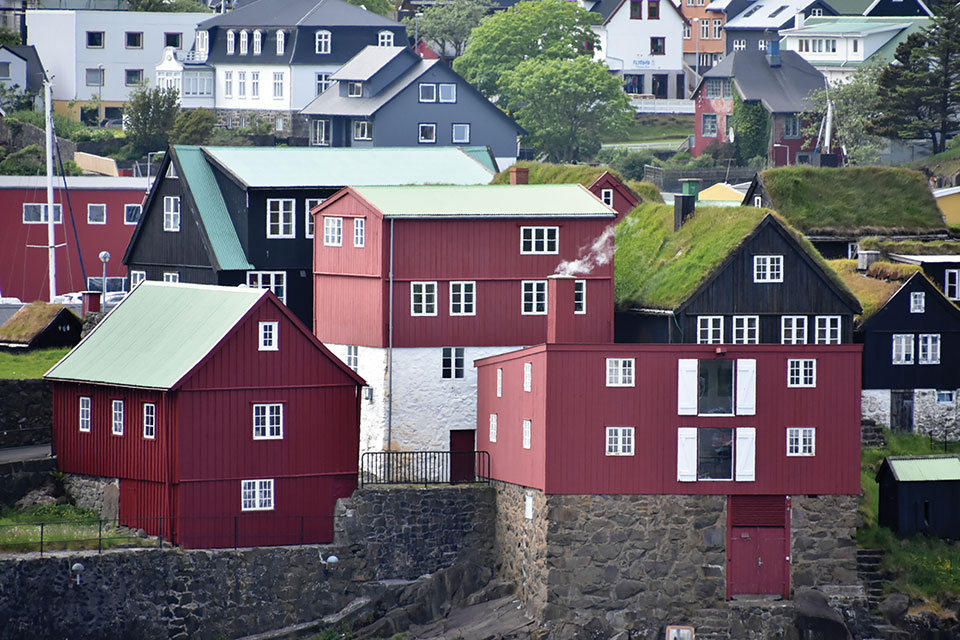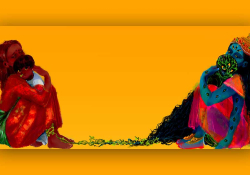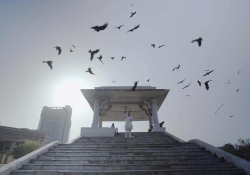Jóhanna Mørk

A chance encounter with a magnetic stranger shifts something inside the narrator of this story set in the streets of Tórshavn.
I first met her around the hot dog carts up by the old school. Gaunt, slightly hunched, she came wading through the hot dog wrappers and broken bottles. A stutter to the tone of the evening, set by dancing at Klubben. The fact it was me she was targeting became clear when a gnarled hand grabbed my arm.
“Here, a greeting from Jesus,” she said, extending a tract. Even though I wasn’t interested, she quietly repeated: “A greeting from Jesus.”
“Tell him to come himself,” I replied, half-drunk and irritable. Her hand was still extended toward me, so I grabbed the pamphlet, wadded it up, and tossed it aside.
I didn’t think too much about this incident again until I saw the woman a week later. It was at the printing press where I worked; abruptly, I recognized the face. Narrow lips. Nose with two bluish marks from where a pair of glasses had chafed. Cheeks that rose in two small ridges, not to mention the large eyes. Slowly, she approached the type case where I was standing and, with a careful nod, bade me good morning. She paused in front of the office door, glanced around again, and then entered. Through the dim glass I could make out her shape. Like one of those large, old birds as she seated herself. Then the boss came into view and a moment later he shouted for me.
Damn, was I going to have to account for my weekends as well? I put down the setting stick, abruptly felt my heart pounding in my throat.
When I entered the office, however, I realized at once that my misgivings were groundless. And I wasn’t the only person her demeanor calmed. This old woman also seemed to have a tranquilizing effect on the boss. Normally, he spoke in clipped sentences that were not unlike telegrams. At the moment, though, he looked at me with his small eyes and said almost sheepishly: “My mother would like a tract printed. Can you take care of it?”
The moment he acknowledged who she was, though, I began to think of those children who, due to negligence, get switched in the birth ward. A miserable bastard race unable to fasten roots on this earth.
“Of course,” I replied, astonished. Never would I have dreamed this old woman could be the boss’s mother. Then again, I’d just started working at the printing press and so wasn’t familiar with the boss’s family tree. The moment he acknowledged who she was, though, I began to think of those children who, due to negligence, get switched in the birth ward. A miserable bastard race unable to fasten roots on this earth.
The old woman, who sat smoothing her dress over her knee, added softly: “I’d like to have fifty copies, and if it’s possible, to get a cross set on each side of the heading.” She paused a moment. “I’d like you to choose the font.” She handed me a handwritten sheet of paper and glanced meekly at her lap.
The letters were large and sweeping, more hand-drawn than written. Reminiscent somehow of old way stones before a forgotten road.
The tract was titled “Jesus Comes” and was scheduled to be ready by the weekend.
Saturday evening brought buckets of rain pouring from the sky. Large tree crowns in the various yards tossed back and forth in the wind. On my way home in the city, I encountered people from the dance club with jackets pulled over their heads. Lampposts gleamed on the streets, stood like glistening torches in the dark.
The few words I’d heard her speak reminded me of the constrained chatter I’d heard in long waiting lines when, as a small boy, I’d bought milk back home on Meiarínum. And also the funeral processions I’d seen from our living room window. Sorrowful faces so much like hers.
As I walked, I wondered about the magnetism exercised by the old woman. The energy with which she professed her faith captivated me. But what truly ignited my curiosity was the story proclaimed by her large eyes and hands. I had the feeling she wasn’t even flesh and blood. Was instead some shattered Russian woman snuck forth from a Maxim Gorky novel. Strolling the gloomy midnight hour through Tórshavn’s streets. The few words I’d heard her speak reminded me of the constrained chatter I’d heard in long waiting lines when, as a small boy, I’d gone to buy milk back home on Meiarínum. And also the funeral processions I’d seen from our living room window. Sorrowful faces so much like hers.
The area around the old school was sparsely populated. An elderly man stood eating a hot dog. Over by the trees two youths were engaged in the strength game of finger pulling, while a young girl was trying to drag another after her. Someone was singing “Hey Jude” as they hailed a taxi.
And so she approached me. In a rain hat and blue rubber boots.
“I knew you would come,” was the first thing she said. “Take this greeting from Jesus. Don’t leave him standing out in the rain and knocking on your heart.” I thanked her and said that her handwritten words were hanging now in my room at home. It was the first time I’d seen her smile. Her long lashes almost touched, a thousand small wrinkles ignited like sunbeams around her eyes.
Suddenly, though, she blanched. A sound, as if from severe pain, escaped her lips. She grabbed the stone wall and stood a second with her eyes shut. When she opened her eyes again, she said in a weaker voice: “I hear the bells ringing now.” Then she stroked my cheek and bade me good night.
I’d discovered her name was Jóhanna Mørk and she lived in a house in the old part of town. Since we’d met, something had happened inside of me. Her figure was always before me. I call to mind the light in her eyes, that kind of knowledge which continues to burn when misery and darkness fill the streets.
I was also fortunate enough to see a picture of her in the office. It had been taken at the Tórshavn parliament building during a cleaning. The photo must be twenty years old. Despite the distance in years, however, I immediately recognized Jóhanna. The venerable parliamentary chairs had been occupied by cleaning women drinking their coffee. A bucket had been placed on the rostrum, no doubt deliberately, and in the Danish chief administrator’s seat sat Jóhanna herself. In the space normally reserved for the Danish royal seal, she’d spread her meal packet with its bread and sugar lumps.
I call to mind the light in her eyes, that kind of knowledge which continues to burn when misery and darkness fill the streets.
Apart from that, I’d only heard bits and pieces about her. A Norwegian whaler was supposedly the son’s father. She and the boy had lived alone. Life had been a constant battle. The one bright spot was the peace she’d found in the Salvation Army.
With such thoughts, I knocked on her green-painted door one evening. The grooved boards, however, gave no answer. I knocked a bit harder, but since there was still no sound, I tried the door handle and found the door open. Inside the kitchen a little wall lamp burned. Beneath the gleam was a pair of medical clogs, and over a chair back a jacket was hung as only foreigners will hang them. No dishes, magazines, or anything else testifying to life.
Suddenly, I heard feet on the stairs and a nurse appeared in the doorway. Perhaps I looked like someone from the electric or telephone company. She regarded me with an expression that could well indicate I’d chosen a very poor moment. Still, once I’d explained my errand and told her who I was, she softened and invited me upstairs.
And there was Jóhanna Mørk, lying with her eyes closed. Worn, blue-veined hands motionless on the coverlet.
“Is she dead?” I asked.
“No. But these last two days she’s been mostly unconscious.”
The attic held the same sort of peace you find in a chapel, and when I asked the nurse what was wrong with her, Jóhanna’s eyes suddenly fluttered. The fingers of one hand twitched. Her head shifted in the direction of the sound.
“Is he here?” she whispered. “Has he come to me?” Slowly her eyes fell back together, and the smile I’d seen up at the old school threatened to flood her face. However, it was as if a glass film had been pressed to her eyelashes and lips. Only on her forehead was there the tiniest quiver.
The nurse brought a stool for me and then withdrew, as if she were trying not to disturb anyone. Carefully, I grasped Jóhanna’s hands, felt how the limp, cold fingers found peace in my grip.
“Remember to give the cat a drop of milk,” she said. And even though she was speaking in delirium, those beautiful, helpless words flooded my eyes with tears. Never before had I felt so welcome in any house.
“Now he’s calling me. I hear the bells ringing. Tell him the key’s hanging beneath the kitchen window.” She was unable to say more. A harsh coughing fit quelled her voice. Blood burst from a corner of her mouth. Startled, I dropped Jóhanna’s hands and stood up. The nurse quickly grabbed a cloth, placed it beneath her chin, and tipped a few drops from a cup into her mouth.
“Why don’t you go into the kitchen? She’ll sleep now.” Pale, I moved to the doorway. The stairs protested with every step down. Even though the coughing fit had abated, still it rung in my head. Slicing through a latticework of pain and guilt. Yes, that’s exactly how it felt. Jóhanna Mørk had prompted the feeling of obligation. Had whisked aside the curtains between the inner and outer Tórshavn. Revealed the crushing loneliness. Daily plagues hanging like larvae and lice in a person’s life. A kind of suppuration that follows people to the grave. And now she was dying. A miserable life on its way to the final chamber.
I broke down in the kitchen. In a sense, I’d never felt so powerless. The sobs caused my shoulders to heave and filled my chest like a storm.
With an oppressive feeling, I stumbled through the streets that night. Experienced the city, as it emerged from the streetlamps, as a place foreign and cold. If before I’d been a part of the city’s pulse, one of the veins threaded through everything in Tórshavn that drew breath, now it felt like that connection had been severed.
And so one day Jóhanna Mørk died. A small flock of people, with her son at the head and the old Salvation Army drummer bringing up the rear, followed her to the grave.
What made this small band a topic of conversation in the city, however, was the fact that a foreigner had been among the followers. Rumor said that he was Norwegian. A man by the name of Stein Hamar, who, judging by appearances, could have been an old sailor. Big, scarred hands. A thin, gold ring in one ear. Small eyes glinting beneath a weather-beaten brow.
The carpenters had already begun gutting the old house, which was going to be converted to a printers, when the old man stopped by. He stood for a while looking around the kitchen. Then he went up to the attic where he must have sat for the better part of an hour. When he came back down, all he said to one of the carpenters was: “Give the key to the boy.”
Translation from the Faroese













